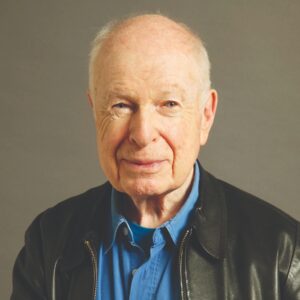
Stage Directions has learned of the death of Director Peter Brook on July 2, 2022 at the age of 97, according to his publisher, Nick Hern Books in a statement they released on Twitter: All of us at NHB are very sad to hear of the death of legendary director Peter Brook, at the age of 97. We’re honoured to have been Peter’s publisher for the past twenty years, sharing his wisdom and insights with the world. He leaves behind an incredible artistic legacy. RIP.
We send our sincere condolences to his family, colleagues, and friends. Requiescat in Pace, Peter Brook.
Brook, born on March 21, 1925, was a theater and film director. He made his directorial debut in the early 1940s before staging a rendition of Shakespeare’s King John in Birmingham. He started working at the Birmingham Repertory Theatre in 1945 and started at the Royal Opera House in 1947. In 1962, Brook started working at the Royal Shakespeare Company (RSC). After bringing avant-garde works by Jean-Paul Sartre and Jean Cocteau to the stage, he went on to direct string of critically acclaimed Shakespeare productions—from a 1955 version of Hamlet with Paul Scofield to a European tour of Titus Andronicus featuring Laurence Olivier and Vivien Leigh.
With the RSC, he directed the first English-language production in 1964 of Marat/Sade by Peter Weiss, which transferred to Broadway in 1965 and won the Tony Award for Best Play, and Brook was honored as Best Director for the production. Brook was also well-known for his Tony Award-winning 1970 production of A Midsummer Night’s Dream with Frances de la Tour, Ben Kingsley, and Patrick Stewart with its minimalist staging.

He was based in France from the early 1970s on, where he founded an international theatre company, playing in developing countries, in an approach of great simplicity. In 1971, with Micheline Rozan, Brook founded the International Centre for Theatre Research, a multinational company of actors, dancers, musicians, and others, which travelled widely in the Middle East and Africa in the early 1970s. It has been based in Paris at the Bouffes du Nord theatre since 1974. The troupe played at immigrant hostels, in villages and in refugee camps, sometimes for people who had never been exposed to theater. He resigned as its artistic director in 2008.
In the mid-1970s, Brook, with writer Jean-Claude Carrière, began work on adapting the Indian epic poem the Mahabharata into a stage play, which was first performed in 1985 at France’s Festival d’Avignon. Brook’s play, Mahabharata, was nine hours long, and toured around the world for four years.
The RSC posted this remembrance of Brook on its website:
We were deeply saddened to hear of the passing of visionary director and RSC Honorary Associate Artist, Peter Brook.
Peter was a giant of European theatre, who breathed exhilarating new life into the art form. His influence at the Royal Shakespeare Company cannot be overestimated, with more than 20 years of artistry and experiment, including the remarkable US, a daring response to the Vietnam war which premiered at the Aldwych in 1966 with a cast including Glenda Jackson.
In 1970, he directed the truly revolutionary A Midsummer Night’s Dream, designed by Sally Jacobs and a cast including Frances de la Tour, Ben Kingsley and Patrick Stewart. This production completely reset what it meant to bring Shakespeare alive for a contemporary audience, and continues to exert a serious influence on theatre artists today.
Erica Whyman, RSC Acting Artistic Director said: “I was privileged to get to know Peter in the 1990s at the National Theatre Studio where he generously shared his practice with younger theatre-makers, and later when I presented his work at Northern Stage. He was a mesmerizing person, fascinated by the potential of human beings to communicate the most delicate feelings and thoughts to one another, by respecting the commanding simplicity of an ‘empty space’.”
Gregory Doran, RSC Artistic Director Emeritus added: “When Peter was last in Stratford in February 2019, he generously agreed to come and talk to the acting company. At 94, he still conveyed the boundless curiosity which has characterized his career. From the Watteau-inspired Love’s Labour’s Lost in Stratford in 1947, to the ground-breaking Titus Andronicus with Olivier in 1955, from the Theatre of Cruelty Season to the legendary A Midsummer Night’s Dream in 1970, from the Marat/Sade to the Mahabharata, Peter defined the essential. We ‘shall not look upon his like again’.”
Peter’s decades of captivating work at Les Bouffes Du Nord emerged from the explorations he was undertaking at the RSC. His influence will never be forgotten and his spirit will be sorely missed.
Rufus Norris, director and joint chief executive of the UK’s National Theatre shared this about Brook: “Peter Brook was the singular theatre practitioner of the last century, both fearless and peerless in his enquiry into the breadth and depth of the form. It is with great sorrow that we mourn his passing, and celebrate his extraordinary life in art.”


